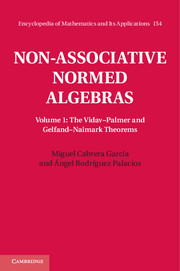Preface
Published online by Cambridge University Press: 05 August 2014
Summary
Reviewing the non-associative part of a monograph by Irving Kaplansky
In 1970, Irving Kaplansky published his small monograph [762] on Algebraic and analytic aspects of operator algebras, and devoted its last section to providing the reader with his impressions concerning non-associative normed algebras. Actually, he began the section by saying:
I predict that when the time is ripe there is going to be quite a flurry of activity concerning nonassociative Banach algebras in general, and nonassociative C*-algebras in particular. Let me take the space to speculate a little on what we may see some day.
Many years have passed since the publication of [762] and, as a matter of fact, most of Kaplansky's predictions have come true, some even exceeding the original expectations. The diverse results corroborating the accuracy of Kaplansky's predictions will be used to illustrate the content of the book we are introducing. Therefore, let us continue reproducing Kaplansky's words in short excerpts, and insert some clarifying comments.
The speculation can start encouragingly, with a fact. The (complex) Gelfand–Mazur Theorem works fine: a normed division algebra must be the complex numbers. Of course, we must agree on what a division algebra A is to be. We take it to mean that for any nonzero x, both Rx and Lx are one-to-one and onto, where Rx (Lx) denotes right (left) multiplication by x.
- Type
- Chapter
- Information
- Non-Associative Normed Algebras , pp. xi - xxiiPublisher: Cambridge University PressPrint publication year: 2014



